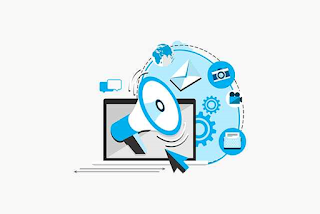Benefits of Social Media Marketing for Business
 |
| Benefits of Social Media Marketing for Business |
The benefits of social media go far beyond the obvious.
They allow you to engage with your audience, give feedback in real-time, and
humanize your brand. In the following paragraphs, you'll learn about the
benefits of social media marketing for your business and budgeting. The
benefits of social media marketing are largely dependent on your own marketing
goals and needs. If you're not sure if social media is right for your business,
read on to discover the most important things about it.
See Also: Scrap Metal Business
Engaging with your audience:
One way to broaden your reach on social media is by engaging
with your audience. The algorithms of social media favor content that generates
meaningful engagement. If your content isn't engaging your audience, it won't
be viewed. Instead, content with high engagement will be displayed at the top
of the feed. Here are some strategies to engage your audience. - Use images,
descriptions, and brand colors. - Respond to comments and mentions of your
brand. People tend to like posts that are fun, human, and relevant.
Reply to comments and direct messages:
Replying to comments
quickly shows potential customers that you care. However, many businesses fall
short of these expectations. You don't need to answer every comment or message,
but a quick response to general comments or praise is a surefire way to boost
engagement. As a bonus, it can be easier than you think. If you're short on
time, set aside a few hours per week for responding to comments and DMs. Fans
appreciate this small effort.
Share Content:
Share content that is "so you." People are more
likely to share something they enjoy if it is "so them." Use your
audience's persona and values to create content that will inspire sharing.
Ultimately, you should be able to generate more attention through social media
marketing than you would otherwise. For example, if your audience is more
interested in political issues than in business, share political topics as
often as you can.
Listen to your customers:
Listen to what they have to say about your product or
service. If you listen to what they have to say, you can respond to their
concerns with the right content. This way, you will be more likely to make
valuable connections with them. It's not enough to simply share your content.
Instead, make it as engaging as possible. Your audience's opinions can drive
your social media marketing strategy.
Build a loyal community:
Social media engagement is critical to building customer
relationships and increasing customer loyalty. It also helps you create brand
loyalty, as people often share and like posts from their friends. And if your
audience feels engaged with your content, they are more likely to become
customers. This is the key to a successful digital presence. If you want your
audience to share your content, they'll be more likely to buy from you.
Targeting the right people at the right time:
If you want your social media campaigns to be effective, it's
important to know who your target market is. This means knowing the basic
demographics of your audience, what their interests and problems are, and what
kind of content they engage with. By utilizing social media marketing, you can
reach the right people at the right time - and maximize your advertising
budget! Here are a few strategies to help you identify and target your target
audience.
 |
| Social Media Marketing |
Creating a target audience is an essential part of a robust
marketing strategy. Once you know who your target audience is, you can build a
content plan that speaks to them. There are many resources available for
creating a content plan, but we recommend using a tool like Simplifier’s
content planner. This is an easy-to-use tool that will help you strategize your
social media campaigns effectively.
After determining who your target audience is, you can
conduct a competitive analysis. This is designed to provide insight and
inspiration into how your competitors are engaging in social media. Using
competitor information allows you to learn about your rivals' social media
engagements and gather additional ideas for your own strategy. You can also use
social media analytics to help you determine which channels to focus your
marketing efforts. This will help you find out which platforms have the best
response from your target audience.
Read Must: SEO Friendly Websites
Another way to better target your audience is to use tools
that allow you to segment your audience by geography, age, interests, and other
factors. Using tools can also make this task easier for you. The more targeted
your audience is, the more likely they will engage with your content and
ultimately become customers.
Before you launch your social media marketing campaign,
decide which platforms you want to focus on. This will give you an idea of
which channels to focus on and which ones are worth keeping. Depending on your
business goals and the demographics of your target audience, you can even test
the channels on which you wish to advertise your business. If your target
audience is younger, consider Instagram because it's an ideal platform for
reaching those people.
Getting real-time data about your customers
One of the most effective ways to improve your social media
marketing strategy is to get real-time data about your customers. Real-time
data is collected as the customer interacts with the brand in the real world.
It can help you make adjustments to your promotional campaign based on what
your customers are saying. For example, if you want to offer a promotion that
is relevant to a certain age group or gender, you can make it for those
demographics. Getting real-time data about your customers is crucial to
improving customer conversion rates and boosting your sales.
Real-time data is a great tool for online retailers to analyze the performance of their products and services. Real-time data allows marketers to track and understand how their customers are reacting to different promotions. They can determine the frequency of purchase, date of purchase, and more. These insights can help them design more effective promotions and increase sales. Real-time data also helps marketers identify buying signals that allow them to deliver more tailored customer experiences at the next step of the buyer's journey.
 |
| Social Media Marketing Business |
The benefits of social media analytics are numerous. You can
track the journey of your customers to see which messages are working and which
ones are not. You can also identify trends in your customer base. Social media
can help you identify segments that need improvement, as well as how to segment
they better. Social media marketing can help you make your brand more relevant
and engaging. So, don't delay any longer and make the most of social media
today! Take advantage of the advantages of real-time data and start
implementing a social media marketing strategy today.
Real-time data allows you to respond quickly to issues with
your customer service. You can reach out to your customers before they even
vent their grievances. If you notice your customers abandoning carts, you
can use the real-time data to market to them in a way that will increase their
likelihood to buy your product again.
Budgeting for social media marketing
If you want to make the most of your social media campaigns,
establishing a budget for your budget is critical. Although it may seem
counter-intuitive, creating a budget for your social media efforts will help
you better understand your business goals. The goal of a budget is to allocate
funds for everything from creating engaging content to expand your
advertising efforts across different platforms. It also helps you track your
expenditures, calculate ROI, and invest in social tactics that will hook
consumers.
A social media budget must also account for various expenses,
including the time spent responding to customer feedback, monitoring and
automation costs, and the cost of promotion/contests for discounts, special
offers, and rewards. This may be a difficult task for both new and established
businesses. Here are some tips to make your budgeting for social media
marketing as effective as possible:
Before setting a budget for your social media efforts, it's
important to decide on the types of media you plan to use. Remember that being
all things to all people rarely works on social media. Becoming more targeted
will ensure you achieve more success. Make sure to establish clear goals and
measure their results regularly to ensure your social media campaigns are
effective.
While the numbers may seem daunting, they are actually very
useful. They provide direction and a roadmap to your marketing efforts. A
social media marketing budget should include the amount of money you plan to
spend on ads, how much to invest on each social network, and a test budget for
a specific market to gauge the success of each. It will also include the tools
you plan to use to measure results. For example, if you plan to use paid
partnerships with social media influencers, make sure you have a budget that is
based on those goals.